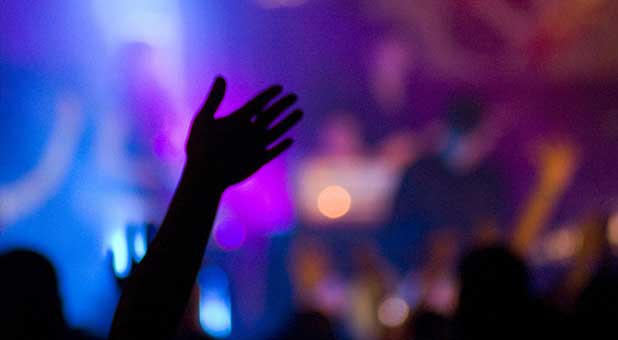I’m not a traditionalist when it comes to worship. I raise my hands when I sing, and I’ve been known to break out in an African dance when the drums give me the appropriate rhythm—thanks to my many visits to Nigeria. When it comes to worship styles I love them all: Hillsong, Matt Redman, Kari Jobe, Chris Tomlin, black gospel anthems and Spanish choruses by Marco Barrientos. I also love the old hymns of my childhood, especially when they’ve been updated with new arrangements.
I like both old songs and new—and I certainly don’t want to stand in the way of innovation. But I’m struggling with the latest Sunday morning praise fad. Can someone help me understand why everybody is singing in the dark?
I never got this memo. I assume somebody had the great idea that Sunday morning visitors shouldn’t feel conspicuous. The discussion at the boardroom table probably went like this: “If we turned down the lights, newcomers could hide on the 14th row and not worry about being seen!” Someone else added: “And low lighting would give our church a hip, contemporary concert feel!” (And the church accountant probably added: “Think of how much money we could save on our electric bill!”)
Okay, I sort of get it. I don’t want visitors to feel awkward, and I want young people to enjoy church. I also know that graphics, video clips and song lyrics are hard to see in broad daylight. But before we close all the curtains and dim all the lights I wish we could talk about this trend. Here are six reasons I’m not convinced darkness is a good thing.
1. Worship shouldn’t be focused on the stage. A skilled worship leader points people to heaven—not to the platform, the singers or the guitarists. If the only lights in the room are on the praise team, worship can quickly become a spectator sport. God likes to hear all His people singing—not just the band.
2. Worship is not just about “me and Jesus.” Worship in a dark room isn’t wrong—but it makes it more about a personal experience and less about corporate connection. There is something deeply inspiring when a congregation joins in unity to exalt Jesus; yet this is lost when we can’t even see each other.
3. Worship is nothing to be embarrassed about. I can sort of understand the desire to dim the lights so newcomers aren’t completely freaked out by hand-raising or other exhuberant expressions of praise. But why hide the excitement? Jesus said: “Everyone who confesses Me before men, I will also confess Him before My Father who is in heaven” (Matt. 10:32). If we’re going to boldly confess Christ, let’s do it in the light where people can see us.
4. Dark auditoriums are risky. Has anyone considered the legal ramifications of this lights-out policy? Suppose a child is trampled in the aisles because a worshiper gets rowdy. What if an elderly person falls and no one notices until the third song is over? Even movie theaters have lighting in the aisles, but I’ve never seen a church that provides that. If you insist on turning the lights off, be careful!
5. Some people think darkness is creepy. The church should be a welcoming place that feels safe and inviting. That’s why we call churches sanctuaries. But psychologists tell us that people who have been abused or traumatized often suffer from fear of the dark. Can you imagine how these people feel in church if the lights go out and strangers are shuffling next to them? Caring pastors will not allow people to feel threatened or unsafe in God’s house.
6. God likes light! The first thing God created was light, and in the last book of the Bible we are told “there will no longer be any night” when Christ rules over the new earth (see Rev. 22:5). We are also told in 1 John 1:5: “God is light, and in Him there is no darkness at all.” So if heaven is full of light, and eternity will be fully illumined by the radiance of God’s glory, why would we want to worship in the dark?
I’m not trying to outlaw creativity in worship, or set a rule on how bright your lights are on Sunday mornings. I just want our worship to be led by the Holy Spirit rather than trendy bandwagons.
J. Lee Grady is the former editor of Charisma and the director of The Mordecai Project (themordecaiproject.org). You can follow him on Twitter at leegrady. He is the author of The Holy Spirit Is Not for Sale and other books.














































